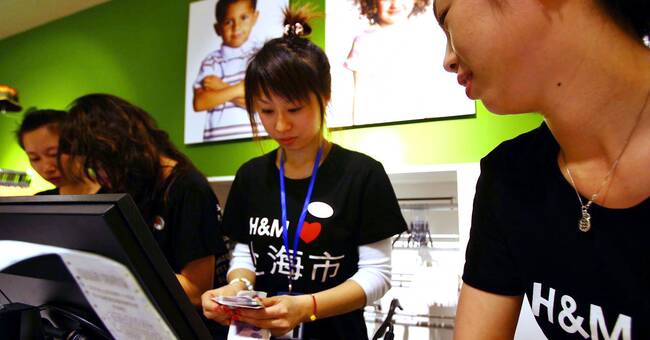H&M is in trouble in China.
To say the least.
When the clothing giant did not want to buy cotton that was suspected of having been produced by forced labor, China took it in stride.
The online app is closed.
20 stores are closed.
And H&M is no longer on the map.
Literally: The stores have been deleted from Apple Maps and Chinese Baidu Maps.
The customer is always right, it's usually hot.
This is the dilemma for H&M in the China crisis: If H&M continues to stand up for human rights, there will be a boycott from the Chinese.
If H&M backs down, it will instead be a revolt from other customers, who only want clothes that are manufactured without forced labor.
It is not possible to give all customers the right thing to do.
Shareholders and others have been waiting for at least a week for H&M to give its view on this serious crisis.
Get questions about China
But the CEO's announcement today became a bulletin, read out on the phone before the presentation of today's earnings report.
With expressions such as “we want to be a responsible buyer, both in China and elsewhere” and “by collaborating with our partners and stakeholders, we believe we can take joint steps to develop the fashion industry, serve our customers and act in a respectful manner. way."
Otherwise completely silent.
Equity analysts had taken the gallop and kindly did not ask about China.
When an individual did it anyway, the CEO only referred to the read-out statement and thanked for the understanding.
It all felt quite far from normal Western stock market communication.
A little more like Chinese TV actually.
Says a lot about China's power
The strange impression becomes especially strange when the reason for China's dissatisfaction is that H&M has spoken out regarding human rights.
That says a lot about China's power, position and significance.
Especially as the Chinese market is actually not as vital for H&M as for some other large Swedish companies.
It accounts for six percent of sales.
It is not a growth market, but on the contrary reduces sales.
It is one of the markets where H&M has closed more stores than they opened in the past year.
We do not know whether H & M's China crisis will be scaled down or up.
It is part of a much larger game, which is also about the political relations between China and the EU.
At best, for H & M's part, it blows over.
But even if it escalates and even makes it impossible for H&M to remain in China, it is actually not at the top of the "Big problems" list for H&M.
The pandemic is the great crisis
The pandemic is worse.
H&M still has stores closed and laid off staff.
Sales were down 20 percent last year.
Predictions about when store visitors would return have been overturned by new virus waves and shutdowns.
There was a loss of billions in the quarterly report presented today.
But the cost savings - or "flexibility" as it is usually called - that have been pushed through during the crisis can continue to benefit even after the crisis.
And finances are still strong.
H&M will also be able to cope with that crisis.
The crisis at the very top is a little more uncertain.
It is about the customers' transfer to online shopping.
It has been accelerated by the corona crisis, and there is much to suggest that that process will continue to go fast now.
H&M is well placed in the transition, but for all chains that have been built with stores from the beginning, it is more difficult to adjust and keep up with the faster development.
To shareholders, one might think that it looks bleak.
But there is hope for a share dividend this autumn, is the message today.
And the stock market price has incomprehensibly gone better than the Stockholm Stock Exchange as a whole in the past year.

